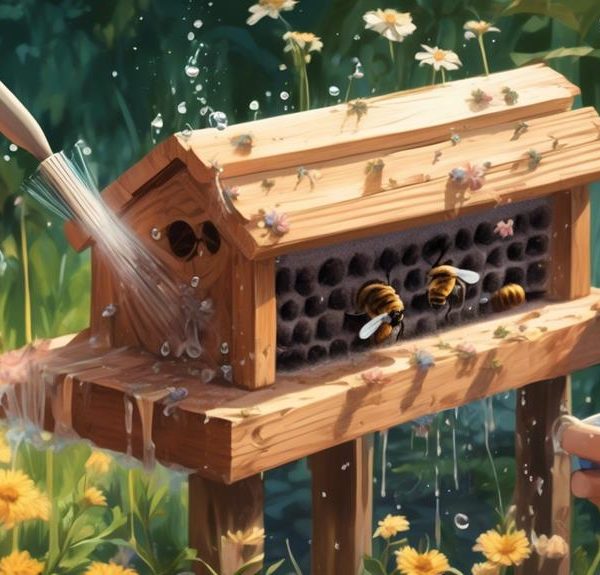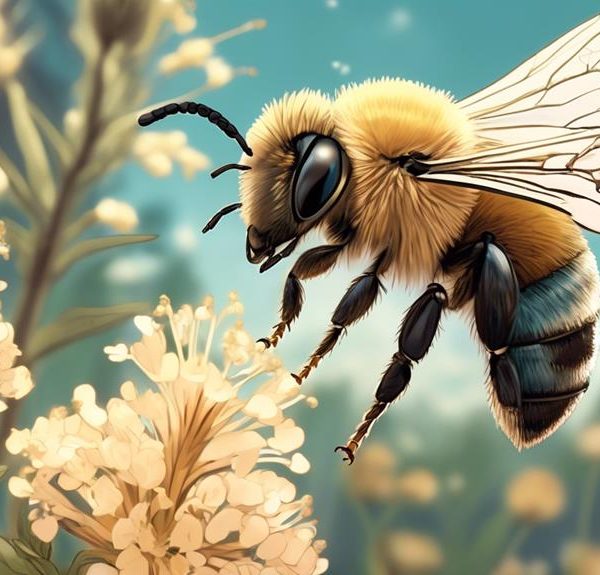Find natural, eco-friendly solutions to repel mason bees from your backyard without harming these essential pollinators, discover more in this guide.
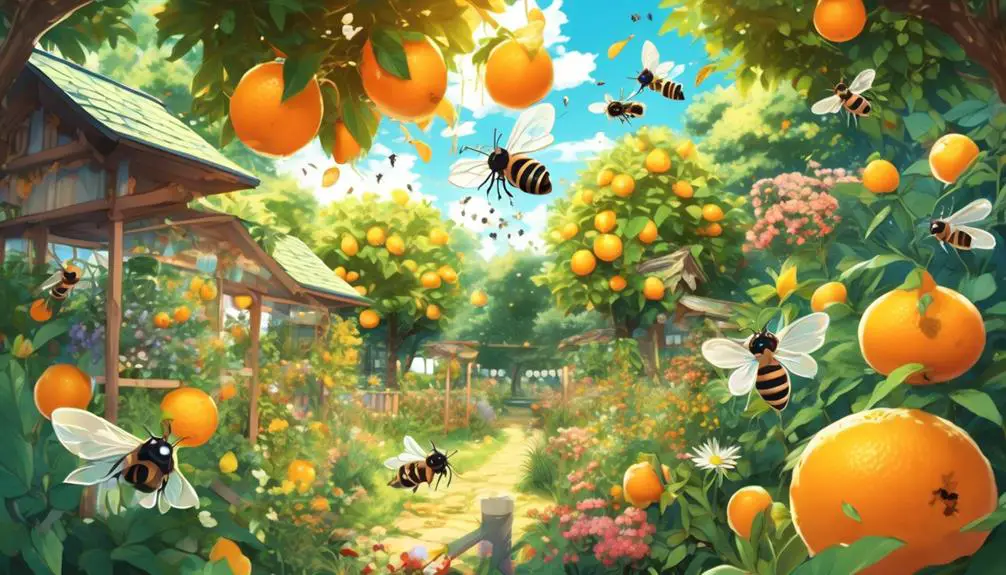
How to Naturally Repel Mason Bees?
You're not alone if you've found yourself in a bit of a buzz with mason bees making themselves at home in your backyard. As much as we appreciate their critical role in pollination, it's understandable that you might not want to share your outdoor space with them.
This guide will show you how to naturally discourage these industrious insects from setting up shop in your personal space. By using a combination of landscaping techniques, essential oils, and DIY recipes, you can create an environment less inviting to mason bees.
Intrigued to know more? Let's venture further into these practical strategies.
Key Takeaways
- Mason bees are solitary creatures that do not live in hives or colonies.
- Essential oils like citronella, eucalyptus, and peppermint can be used as natural bee repellents.
- Landscaping techniques, such as incorporating more human activity and planting dense shrubs, can discourage bee nesting.
- DIY mason bee repellent recipes, using citrus peels or cucumber peels, can create an environment bees find unfavorable.
Understanding Mason Bees' Behavior
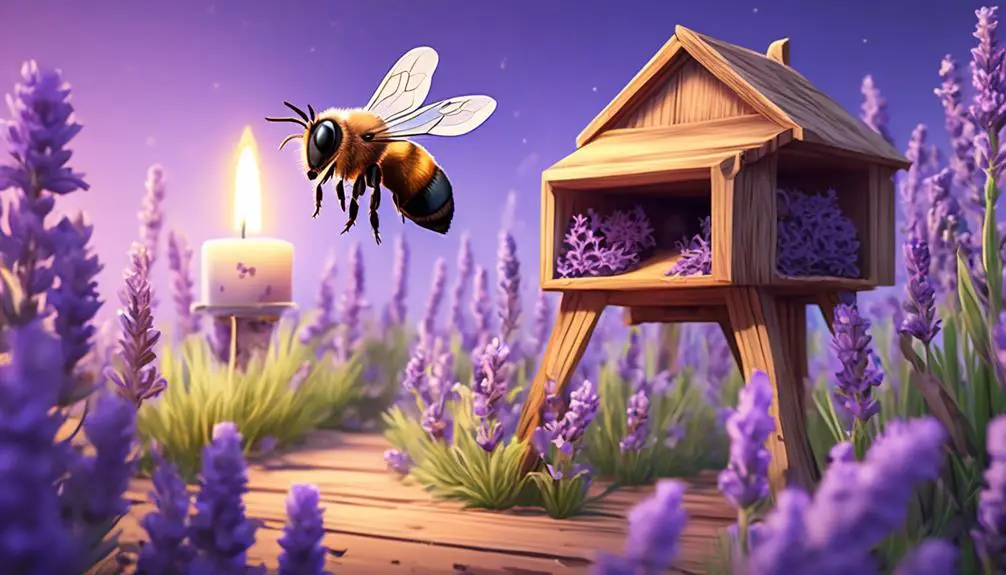
To effectively repel Mason bees, you need to first understand their unique behaviors and tendencies. Unlike honeybees, Mason bees are solitary creatures. They don't live in hives or colonies. Instead, they seek out individual nesting sites, often in small cavities or tubes. They're typically active in the spring, when they mate and lay eggs.
You'll often find Mason bees near flowers, as they're prolific pollinators. They're not aggressive but will sting if threatened. They're known to be very beneficial to the environment, but their solitary nature can cause problems if they choose to nest in your home.
Mason bees have a unique way of laying eggs. The female lays an egg, supplies it with pollen and nectar, and then seals off the chamber. This process continues until the tube is full.
Understanding these behaviors is crucial to repelling Mason bees. If you know what attracts them, you can make your home less appealing. For example, they're attracted to small holes or gaps for nesting. Sealing these off can help to deter them. Also, reducing the amount of flowering plants around your home can decrease their presence.
Natural Bee Repellants: Essential Oils

For a natural, non-toxic approach to repelling Mason bees, you might want to consider the use of essential oils. Essential oils have been proven in various studies to be effective deterrents and are derived from plants. They are highly concentrated versions of natural oils and have been used for centuries in various cultures for their medicinal and therapeutic benefits.
In the context of repelling Mason bees, certain essential oils are particularly effective. Citronella, eucalyptus, and peppermint oils are known to be potent bee deterrents. These oils contain compounds that bees find unappealing, deterring them from areas where the oils are present. You can apply these oils around your property, particularly in areas where you've noticed bee activity.
However, it's important to note that essential oils should be used sensibly. They are potent substances and can be harmful if used excessively or improperly. Always dilute essential oils with a carrier oil before application. This not only ensures safety but also prolongs the effectiveness of the oil.
Landscaping to Discourage Bee Nesting
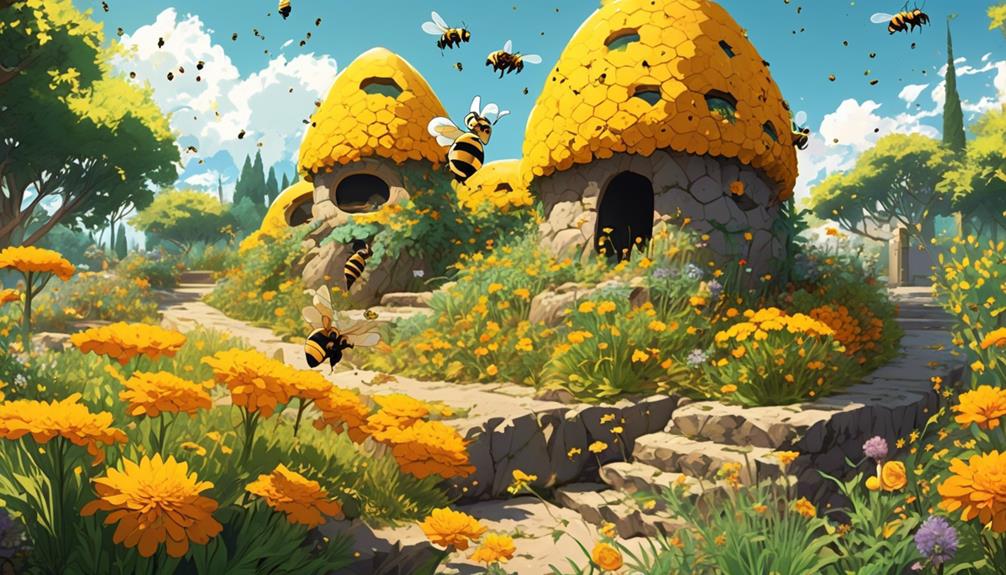
Beyond the strategic use of essential oils, altering your property's landscape can also serve as a highly effective, natural deterrent to Mason bees. You can do this by modifying the habitat to make it less appealing for nesting.
First off, Mason bees are solitary creatures and prefer quiet, undisturbed areas. Therefore, incorporating more human activity into your garden or yard might discourage them from setting up home. Consider adding a seating area or a children's play zone.
Secondly, these bees are attracted to bare wood and hollow stems for nesting. So, cleaning up deadwood and pruning back hollow-stemmed plants can limit their options.
Thirdly, remember that Mason bees need mud to construct their nests. If your landscape is rich in clay soil or if you've a mud source, you're inadvertently inviting them. By replacing clay soil with sand or gravel, and covering mud puddles, you can make your property less attractive to them.
Lastly, these bees prefer sunlit areas for nesting. Planting dense, tall shrubs or trees to create shade can deter them.
DIY Mason Bee Repellant Recipes
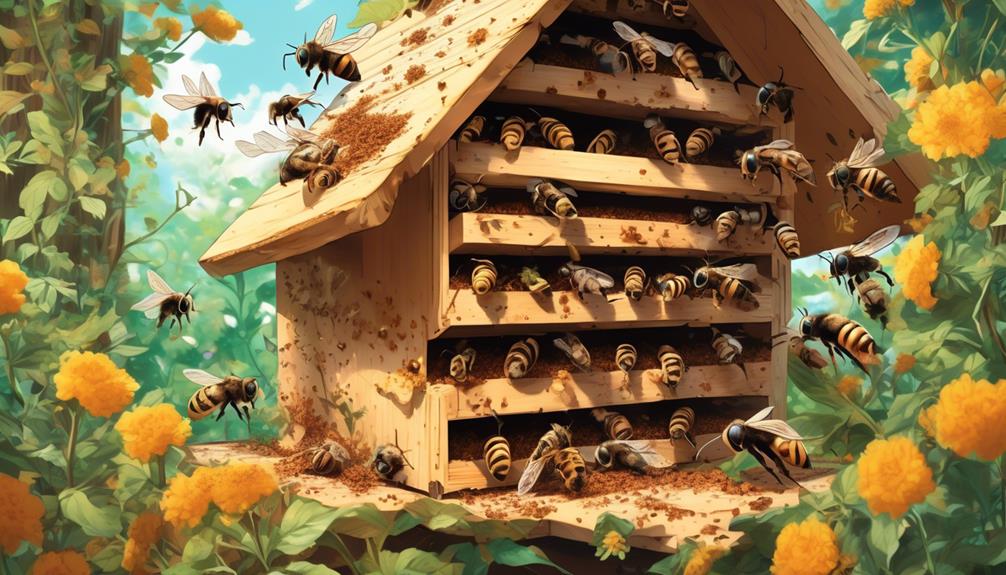
If you're keen on keeping Mason bees at bay, concocting your own natural repellants can be an effective and eco-friendly solution. These repellants can be made using easily available ingredients that are non-toxic to the bees and other wildlife.
Before you start, it's vital to understand that the goal here is not to harm the bees, but to create an environment they find unfavorable, thus deterring them from nesting in your vicinity. You're aiming for a peaceful coexistence, not a battle.
Now, let's discuss two simple yet efficient repellant recipes you can whip up at home.
Ingredients | Directions |
|---|---|
Citrus Peels (Lemons, Oranges) and Water | Boil citrus peels in water. Allow the mixture to cool and strain. Spray the liquid in areas where you've noticed Mason bee activity. |
Cucumber Peels and Water | Blend cucumber peels with water to create a fine mixture. Strain and use the liquid as a spray. Cucumber's bitter compounds are known to deter bees. |
Maintaining a Bee-Free Environment
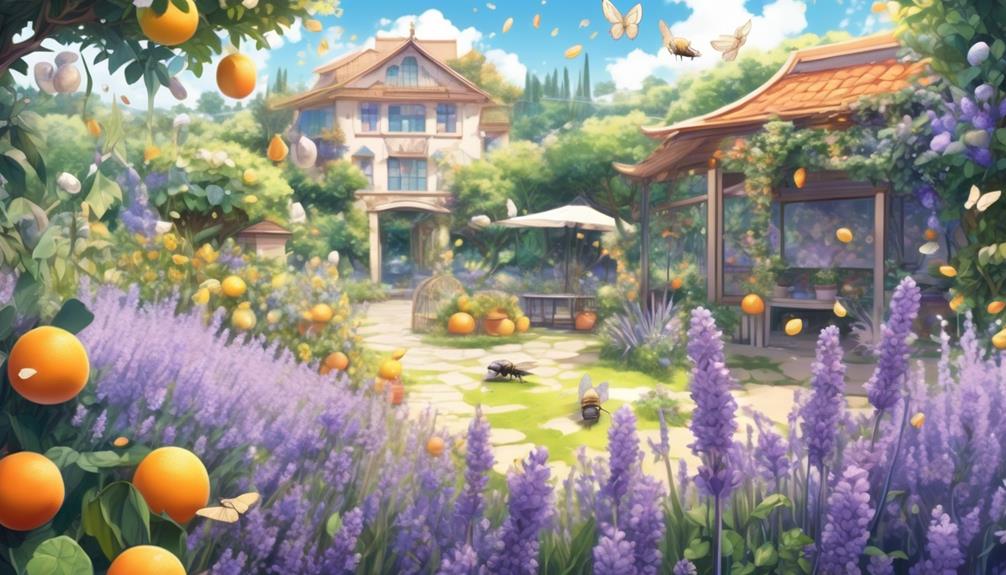
Having established your homemade repellants, it's equally crucial to adopt strategies that ensure your living space remains unattractive to Mason bees. Start by eliminating potential nesting sites. Mason bees prefer to nest in small holes or tubes, often in wood. You should seal these openings, replace rotting wood, and clear away hollow stems in your garden.
Next, consider your plant selection. Mason bees are attracted to flowering plants, especially those that produce nectar and pollen. If you're not looking to attract bees, opt for plants that don't flower or produce less pollen. You can consult with a local nursery or botanist for appropriate plant suggestions.
Lastly, maintain cleanliness in your outdoor spaces. Bees are attracted to sweet food and drink spills, so you should clean these up immediately. Trash cans should be tightly sealed to prevent bees from being drawn to the scent of discarded food.
Conclusion
So, you've got the knowledge to naturally repel mason bees! Remember, understand their behavior first. Then, use essential oils as natural repellants, and landscape your garden to discourage nesting.
Try some DIY repellant recipes. Finally, maintain a bee-free environment. It's important to respect all creatures, including bees.
With these strategies, you can keep mason bees at bay while still supporting your local ecosystem. Good luck!

